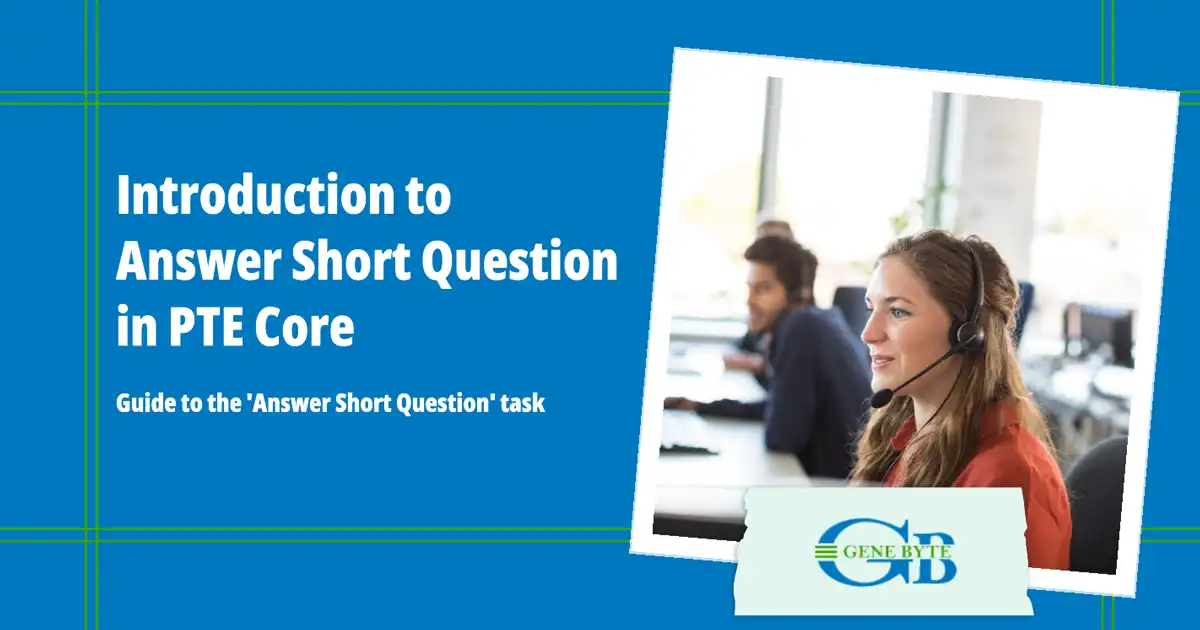PTE Core Insights:
Answer Short Question for Educators
A Teacher's Guide to PTE Core Answer Short Question

"Unlock the secrets to acing PTE Core ASQ with Genebyte's AI-powered platform."
As your guide through the intricate world of PTE Core preparation, I, Vanita, a seasoned Sales Manager at Genebyte, am here to illuminate the path toward mastering the Answer Short Question task from the Speaking Section. This particular task stands as a testament to the exam's demand for precision and swift thinking, challenging candidates to respond promptly and accurately to questions heard. It's an item that finely balances the art of listening and the skill of concise speaking, encapsulating the essence of real-world communication efficiency.
In the dynamic landscape of PTE Core preparation, the "Answer Short Question" task stands out for its succinct challenge, compelling test-takers to muster precision under time constraints. This task, ending the Speaking section, epitomizes the real-world utility of language: conveying accurate answers swiftly. It's a litmus test for both listening and speaking skills, requiring responses in just a word or two based on general knowledge. Keep in mind that the ASQs in PTE Core are quite different than academic literature based PTE Academic Exam.
At Genebyte, we leverage cutting-edge AI technology to equip teachers with the tools necessary to guide students through this task, enhancing their ability to think on their feet and deliver succinct responses. Join me as we delve into strategies and insights designed to conquer the "Answer Short Question" task, propelling students towards success in PTE Core and beyond.

Introduction to Answer Short Question
In the world of PTE Core, a unique task that tests both listening and speaking abilities of candidates is the Answer Short Question (ASQ) question-type. This task is deceptively simple yet profoundly effective in gauging a test-taker's ability to comprehend spoken English and respond concisely. The essence of ASQ lies in its straightforwardness: candidates listen to a question and are required to answer in a few words, usually one or two. This simplicity, however, belies the task's significance in assessing critical listening and precise speaking skills.
Importance of ASQ in Assessing Listening and Speaking Skills
The ASQ question-type is ingeniously designed to evaluate two core communicative skills simultaneously. First, it tests listening skills by presenting questions that range from 3 to 9 seconds in length, challenging candidates to grasp the essence of the question quickly. The prompt's brevity demands focused attention and the ability to decipher key information from a short audio clip.
Second, it assesses speaking skills through the requirement of a concise response. With a response window of 10 seconds and the need to start speaking within 3 seconds, the task places a premium on swift, accurate articulation of thoughts. This dual focus makes ASQ an integral component of the PTE Core's speaking section, contributing to both the listening and speaking communicative skill scores.
Notably, ASQ does not allow for templates or extensive preparation strategies, emphasizing spontaneous comprehension and response. This format ensures that candidates' answers reflect their immediate understanding and verbal expression capabilities, making ASQ a genuine test of everyday conversational English. Moreover, ASQ's inclusion in the PTE Core underscores the exam's commitment to evaluating practical language skills relevant to everyday life and the workplace. The questions are grounded in general knowledge and common scenarios, ensuring that the task is accessible to all candidates, irrespective of their academic or professional backgrounds.
In the broader context of PTE Core preparation, understanding the nuances of ASQ can significantly benefit candidates. It encourages the development of listening skills that extend beyond the exam room, fostering a deeper engagement with the English language in various forms, such as podcasts, news broadcasts, and everyday conversations. For educators and trainers, emphasizing the importance of ASQ can enhance their teaching strategies, equipping students with the skills needed for both exam success and real-world communication. Nailing this question type can actually bring a significant difference in your scores, along with the high scoring Read Aloud and Repeat Sentence question types!
A very important of the PTE Core speaking, this qestion-type is followed by the PTE Writing section which has two main question types: the Summarize Written Text and the Write Email.

Unraveling the Simplicity of Answer Short Question in PTE Core
One of the unique aspects of the PTE Core exam is the Answer Short Question (ASQ) task, a straightforward yet pivotal component that assesses both listening and speaking skills efficiently. This task is designed with simplicity at its core, requiring candidates to listen to a question and respond succinctly, typically with a single word or a few words.
Prompt Length and Skills Assessed
The ASQ task is brief, with prompts ranging from 3 to 9 seconds, aimed at evaluating the candidate's ability to process spoken English and articulate a concise response. Each question is crafted to test listening comprehension and the quick retrieval of information, challenging students to demonstrate their vocabulary strength and their capacity to understand and respond to spoken queries. With only 10 seconds allocated for responses, and the need to start speaking within 3 seconds, the task underscores the importance of promptness and precision in communication.
Understanding the ASQ Task
At its essence, the ASQ task is about efficiency and accuracy. Candidates are presented with questions that tap into everyday knowledge and vocabulary. These could range from defining objects, describing situations, to identifying opposites or selecting correct words from given options. This format ensures that while the task is accessible to all levels of English proficiency, it also serves as a reliable measure of a candidate's listening and speaking skills.
Strategic Preparation for ASQ
For educators and trainers, understanding the ASQ task's simplicity and significance is crucial. It presents an opportunity to enhance students' listening skills and vocabulary recall through targeted practice. Encouraging engagement with English in varied forms—be it through podcasts, news broadcasts, or conversation groups—can significantly benefit students. Furthermore, practicing with AI-based tools like those offered by Genebyte not only prepares students for the format of ASQ but also provides immediate feedback, enabling focused improvements.

Understanding the Scoring Criteria of the Answer Short Question
In the landscape of PTE Core exam preparation, comprehending the scoring criteria for different question types is crucial for both teachers and students. One such task that presents a unique scoring mechanism is the Answer Short Question (ASQ). This task assesses a candidate's ability to listen to a question and respond concisely with a single word or a few words. Understanding the ASQ's scoring nuances can significantly impact a student's performance, especially concerning their listening, speaking, and overall PTE Core scores.
Scoring Dynamics of ASQ
The scoring criterion for ASQ is straightforward yet impactful. Responses are scored as either correct or incorrect, dependent entirely on the appropriateness of the word choice in the answer. This binary scoring system emphasizes the importance of accuracy over verbosity. The task does not test writing skills, and reading skills are solely utilized for understanding the instructions. This specificity in skill assessment makes ASQ a unique component of the PTE Core exam.
- Correct/Incorrect Scoring:
- 1 point for an appropriate word choice in response
- 0 points for an inappropriate word choice or no response
Strategic Implications for Teachers
For teachers guiding students through PTE Core preparation, emphasizing the ASQ task's scoring criteria offers several strategic advantages:
- Focus on Vocabulary: Since the task revolves around vocabulary, encouraging students to broaden their lexicon across various subjects can prepare them for a wide range of questions.
- Listening and Speaking Skills: Highlighting that ASQ scores contribute to both listening and speaking communicative skill scores, teachers can integrate practice that enhances these areas concurrently.
- Efficiency in Response: Teaching students the art of concise and accurate responses, without the need for full sentences, can save precious time and reduce the cognitive load during the exam.
- Guessing Strategy: Since there is no penalty for incorrect answers beyond receiving zero points for that item, encouraging educated guesses can sometimes turn into scoring opportunities.
Impact on Overall Performance
The ASQ task, while seemingly straightforward, can significantly influence a student's overall PTE Core performance. Its direct contribution to listening and speaking scores underscores the need for a well-rounded preparation strategy that includes a strong focus on vocabulary and listening comprehension skills. Moreover, the simplicity of the scoring criterion for ASQ offers a clear target for students - accuracy in understanding and responding to the question presented.

Strategies for Success in Answer Short Question Task
In the realm of PTE Core exam preparation, Genebyte's innovative B2B SaaS platform emerges as a beacon for coaching institutes aiming to fine-tune their trainers' capabilities and significantly boost student outcomes. A pivotal component of this exam is the Answer Short Question (ASQ) section, a segment that tests a candidate's quick thinking and succinct expression capabilities in English. This task requires examinees to listen to a question and provide a brief, usually one or two-word answer, without the necessity for a full sentence. Here, we delve into effective strategies to master this task, enhancing both listening and speaking skills crucial for excelling in PTE Core.
Emphasizing the Essence of Conciseness
The essence of the ASQ task lies in its demand for concise responses. This section gauges a candidate's ability to extract the crux of the question and respond with the most appropriate word(s). Teachers should emphasize the importance of brevity, guiding students to focus on answering with one or two words that directly address the question's core. For instance, if the question is, "What do we call the process of water turning into vapor?" the succinct answer would be "Evaporation," without the need for elaboration.
Preparation Tips for Listening Closely and Responding Promptly
To prepare students for the ASQ section, coaches should focus on exercises that sharpen listening skills and promote rapid response formulation. This can include practices like:
- Listening Drills: Engage students with audio clips that pose various questions, gradually reducing the response time to simulate exam conditions.
- Mock Tests: Utilize Genebyte's AI-evaluated mock tests that include ASQ tasks, offering real-time practice and feedback.
- Vocabulary Enhancement: Encourage reading and listening to content across diverse topics to broaden students' lexical resource, ensuring they have the right word at their disposal when needed.
Enhancing General Knowledge
A solid foundation of general knowledge significantly aids in confidently tackling ASQ tasks. Since questions may span a wide array of subjects, from science to everyday phenomena, enriching one's general knowledge is key. Strategies include:
- Curated Reading Lists: Provide students with articles, blogs, and news summaries on varied topics.
- Discussion Forums: Organize group discussions on current events, scientific discoveries, and cultural facts to foster an environment of learning and curiosity.
- Interactive Quizzes: Deploy quizzes that cover general knowledge topics, making learning both engaging and educational.

Common Challenges and Solutions in Answer Short Question Task
The Answer Short Question (ASQ) component of the PTE Core test presents a unique set of challenges for candidates. It assesses listening and speaking skills by requiring candidates to listen to a question and respond promptly with a brief answer, typically one or two words. Below, we outline common challenges faced by students during ASQ tasks and offer strategies to navigate these hurdles successfully.
Focused Listening and Quick Response
One of the primary difficulties students encounter with ASQ tasks is the need for focused listening followed by an immediate response. The task's pace does not allow much time for reflection, demanding quick thinking and fast, accurate answers.
Solution:
- Practice Active Listening: Improve your listening skills by engaging with a variety of English audio materials, such as podcasts, news broadcasts, and educational videos. This exposure will help you become more adept at understanding spoken English in different accents and contexts.
- Simulate Test Conditions: Regularly practice ASQ tasks under timed conditions similar to the PTE Core test. This practice can help acclimate you to the pressure of having to listen and respond quickly.
Enhancing General Knowledge
Another challenge is the broad range of topics ASQ questions can cover. Since these questions often relate to general knowledge or common English vocabulary, a limited understanding of various subjects can hinder a candidate's ability to answer confidently.
Solution:
- Expand Your Knowledge: Regularly read articles, books, and watch documentaries on a wide range of topics. This habit will not only improve your reading skills but also broaden your general knowledge, making you more prepared for any question.
- Practice with Trivia: Engage in trivia games or quiz apps that cover general knowledge. These activities can make learning fun and improve your ability to recall information quickly.
Overcoming Nervousness and Hesitation
Many candidates feel nervous during the ASQ task, leading to hesitation or a delay in responding. This nervousness can affect the fluency of their answer and, in some cases, lead to missing the opportunity to respond within the allotted time.
Solution:
- Build Confidence through Repetition: The more you practice ASQ tasks, the more confident you will become in your ability to answer swiftly. Use practice tests to familiarize yourself with the question format and reduce test-day anxiety.
- Use Techniques to Stay Calm: Employ relaxation techniques before and during the test, such as deep breathing, to calm nerves and maintain focus.

Role of Teachers in Preparing Students for Answer Short Questions
As educators and facilitators, teachers play a pivotal role in guiding students through the nuances of the PTE Core, particularly when it comes to the Answer Short Question (ASQ) segment. This task, seemingly straightforward, requires students to listen to a question and respond with a single word or a few words. Despite its simplicity, ASQ can pose significant challenges to students, primarily due to the quick thinking and focused listening it demands. Here, we delve into strategies and methodologies teachers can employ to effectively prepare their students for ASQ tasks, thereby enhancing their overall PTE Core preparation.
Understanding the ASQs: A Snapshot
Before diving into preparation strategies, it's essential to grasp what the ASQ task entails. During the ASQ portion of the PTE Core exam, students are presented with a question, to which they must respond succinctly—usually in one or a few words. This task assesses both listening and speaking skills, making it a critical component of the speaking module. Questions are typically grounded in general knowledge, ranging from definitions and opposites to selecting the correct word among provided options.
Strategies for Effective ASQ Preparation
- Focused Listening Practice: Encourage students to engage in exercises that enhance their ability to pick out key information from spoken sentences quickly. This could involve listening to short audio clips or podcasts on a variety of subjects, then summarizing the main points in a few words.
- Rapid Response Training: Develop drills where students practice giving immediate responses to questions. This helps in reducing hesitation and improves their ability to think on their feet—a crucial skill for ASQ tasks.
- Vocabulary Expansion: Broadening students' vocabulary is vital for success in ASQ. Use flashcards, word games, and regular quizzes on synonyms, antonyms, and definitions to reinforce their word bank.
- Real-World Application: Incorporate everyday scenarios into practice sessions. Ask students random questions related to their surroundings or daily activities, mimicking the general nature of ASQ prompts.
- Test Simulation: Use Genebyte's AI-based technology to simulate the ASQ part of the exam. The realistic test environment helps students acclimatize to the exam's pace and pressure, making them more comfortable during the actual test.
- Feedback and Reinforcement: Utilize the instant feedback feature of our platform to point out areas of improvement. Praise correct responses and gently correct wrong ones, encouraging students to learn from their mistakes.
- Confidence Building: Confidence is key in the ASQ section. Conduct mock tests and speaking drills that bolster students' self-assurance, ensuring they approach their exam with a positive mindset.
- General Knowledge Enhancement: Given that ASQ questions are rooted in general knowledge, encourage students to read broadly. Suggest newspapers, magazines, and informative websites that cover a wide range of topics.
Incorporating ASQ Practice into Teaching Plans
A comprehensive teaching plan for PTE Core preparation should dedicate specific sessions to ASQ practice. This includes:
- Scheduled Listening Sessions: Allocate time for students to listen to various English audio materials, followed by ASQ-style questions related to the content.
- Group Discussions: Facilitate group discussions on diverse topics to improve spontaneous speaking abilities.
- Regular Vocabulary Tests: Conduct frequent vocabulary tests focusing on the types of words typically encountered in ASQ tasks.
- Mock Exams: Regularly schedule mock exams that include the ASQ task, using Genebyte's platform to replicate the exam environment accurately.
By implementing these strategies, teachers can significantly enhance their students' proficiency in handling the Answer Short Question tasks in PTE Core.

Utilizing Genebyte's AI Software for ASQ Practice
As the landscape of PTE Core preparation evolves, Genebyte introduces an unparalleled asset for coaching institutes aiming to excel in the Answer Short Question (ASQ) segment. Recognizing the pivotal role of ASQ in evaluating listening and speaking proficiencies, Genebyte's AI-based practice software emerges as a cornerstone for effective preparation strategies.
The Genebyte Advantage
Real-time Feedback and Progress Tracking
Genebyte's software, powered by advanced AI, offers students immediate feedback on their ASQ responses. This feature not only illuminates their strengths and weaknesses but also provides actionable insights for improvement. The software's capability to track progress over time enables both students and trainers to witness tangible advancements in skill levels, fostering a motivating learning environment.
Extensive Practice Questions Database
With an expansive repository of practice questions tailored to mirror the PTE Core's ASQ format, Genebyte ensures comprehensive coverage of potential exam content. Each mock test has PTE Core exam relevant ASQs added to them as well. This vast collection enables students to encounter a wide array of topics, honing their ability to respond swiftly and accurately under exam conditions!
Personalized Learning Journeys
Understanding the diversity in learner's needs, Genebyte's platform customizes practice sessions based on individual performance analytics. This personalized approach ensures that students focus on areas requiring the most attention, thus optimizing their study time and accelerating improvement.
Technological Excellence
Genebyte's commitment to incorporating cutting-edge technology, as highlighted in our knowledge base, extends to every facet of the software. From seamless integration capabilities that ensure a smooth user experience to the utilization of cloud-based learning platforms for anytime, anywhere access, Genebyte sets a new standard in educational technology.
Supporting Teachers to Maximize Student Outcomes
Genebyte recognizes the crucial role of teachers in the learning process. Our software includes tools that empower teachers to monitor student progress, customize learning materials, and efficiently manage their teaching plans. By reducing administrative burdens and enhancing instructional quality, Genebyte enables teachers to dedicate more focus to student engagement and personalized instruction.
A Partnership for Success
In adopting Genebyte's AI-based practice software, coaching institutes not only equip their students with the skills to excel in the ASQ segment of the PTE Core but also position themselves as leaders in the competitive landscape of language proficiency training. Genebyte's software aligns with the business objectives of coaching institutes, offering a scalable solution that adapts to their evolving needs while meeting students' learning demands.

Actionable Recommendations for ASQ Preparation: Harnessing the Power of Genebyte's AI
In the ever-evolving landscape of PTE Core preparation, Genebyte's AI-based software emerges as a beacon of innovation, particularly in mastering the Answer Short Question (ASQ) question-type. This segment aims to encapsulate actionable insights and a conclusive overview, guiding educators on leveraging Genebyte's cutting-edge technology to enhance their teaching methodologies.
- Leverage Real-time Feedback: Utilize Genebyte's AI to provide immediate corrections and suggestions, enabling students to recognize and rectify errors instantaneously.
- Extensive Practice Questions: Dive into our vast repository of practice questions designed to mirror real exam scenarios, ensuring students are well-prepared for anything PTE Core might throw their way.
- Progress Tracking: Employ our intuitive dashboard to monitor student progress meticulously, identifying strengths and pinpointing areas needing improvement for a targeted teaching approach.
Encouraging Engagement and Exploration
We advocate for an integrative approach towards PTE Core ASQ preparation. Beyond utilizing Genebyte's software, we recommend a multifaceted strategy:
- Diversify Learning Materials: Incorporate English media such as podcasts and news broadcasts into study routines to enhance listening skills and comprehension.
- Engage in Conversational Practice: Encourage participation in English conversation groups, fostering quick, responsive verbal skills crucial for ASQ success.
- Expand Vocabulary through Reading: Promote reading diverse materials to broaden vocabulary and grasp idiomatic expressions, bolstering the ability to deliver concise, correct answers.
Genebyte's AI-based platform represents more than just a technological solution; it embodies a comprehensive ecosystem designed to elevate the educational journey for both students and educators. By integrating real-time analytics, interactive mock tests, and an intuitive, customizable user interface, Genebyte addresses the nuanced demands of PTE Core preparation, particularly the ASQ section. After this, candidates proceed to the Summarize Written Text item-type in the Writing section. Our platform's scalability ensures it is adept at handling diverse learning needs, from individual tutoring sessions to large classroom settings, making it an indispensable tool for coaching institutes aiming for excellence in PTE Core preparation.
As we draw this discussion to a close, the path forward is clear. Embracing Genebyte's software is not just about adopting a tool; it's about transforming the educational paradigm. We invite educators and institutes to explore the benefits firsthand. Sign up for a trial or contact us for a demonstration, and witness how Genebyte can be the catalyst for achieving unprecedented success in PTE Core preparation.
Together, let's unlock the full potential of your students, preparing them not just for the ASQ question-type but for a future where their communication skills open doors to global opportunities.
Frequently Asked Questions
For PTE Core's Answer Short Question (ASQ) tasks, responses should be concise, typically a single word or a few words, directly addressing the query without the need for complete sentences.
A short answer question in PTE Core assesses your ability to listen to a spoken question and promptly provide a brief, accurate answer, testing both listening and speaking skills.
Yes, certain ASQs in PTE Core exams may recur. Familiarity with a wide range of general knowledge topics and regular practice can significantly improve performance on these questions.
Engage in listening exercises, practice with AI-based tools like Genebyte for real-time feedback, and enhance general knowledge through reading and multimedia content to excel in ASQ tasks.
Scores for ASQs are binary, based on the appropriateness of the response: correct (1 point) for appropriate word choice and incorrect (0 points) for inappropriate responses or no answer.
A short response typically involves answering with one or a few words immediately after the question, without elaborating or forming complete sentences.
Listen carefully, answer promptly, and maintain focus throughout the listening segment. Utilize resources like Genebyte for targeted practice and feedback.
Absolutely. An extensive vocabulary enhances your ability to understand questions and provide accurate answers swiftly, contributing positively to your ASQ performance.
Listening accuracy is crucial as it ensures you understand the question correctly, which is the first step toward providing a correct response.
Teachers can utilize platforms like Genebyte to provide students with real-world practice questions, leveraging AI for immediate feedback and incorporating interactive listening exercises into their curriculum.
Genebyte provides a comprehensive suite of tools including AI-evaluated mock tests, real-time feedback on responses, and a vast question bank for rigorous ASQ practice.
Real-time feedback allows learners to immediately understand their mistakes, adjust their responses accordingly, and progressively improve their listening and speaking accuracy for the ASQ tasks.